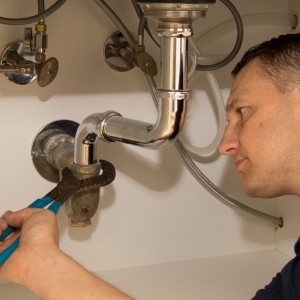 Water is a fascinating substance. Roughly three quarters of the Earth is covered in it, and it makes up about three quarters of our bodies as well. Water is capable of dissolving more substances than any other liquid and has the amazing property of expanding when it freezes.
Water is a fascinating substance. Roughly three quarters of the Earth is covered in it, and it makes up about three quarters of our bodies as well. Water is capable of dissolving more substances than any other liquid and has the amazing property of expanding when it freezes.
Though all of those facts are very interesting, some of them can lead to big problems. For example, when water freezes and expands, it can do serious damage to your plumbing. There are a few things you can do to deal with this issue and a few things you can do to prevent it from happening in the future.
Dealing with Frozen Pipes
If the temperatures have been extremely cold lately, and no or very little water trickles out when the faucet is turned all the way up, you are probably dealing with frozen pipes. Here are some steps you can take to fix it:
Step 1. Turn off the main stop tap. You will probably find this valve under your kitchen sink or by your main water valve. It’s best to keep the water from flowing freely in case the frozen water caused damage to your pipes.
Step 2. Keep the faucet turned on. It will relieve pressure and allow any water in the pipes to slowly flow out while helping to melt the ice blockage.
Step 3. Apply heat to the frozen sections of pipe, starting from the tap and moving along the pipeline. Put a heating pad around the pipe or use a hair dryer to thaw it. Never use any kind of open flame device to apply heat to your pipes.
Step 4. Once you’ve thawed the pipes, check for any damage that may have been done when the water expanded into ice.
Step 5. If there is no apparent damage, turn the stop tap back on and run the water until full flow has been restored. If the pipes are damaged, call a plumber to repair them right away.
How to Prevent Frozen Pipes
You don’t have to expect frozen pipes every winter. You can do a few things to prevent them.
Insulate—Before winter hits, make sure you have good insulation in the walls around your pipes to help keep the cold out.
Keep it warm—On very cold days, do what you can to keep the pipes warm. Opening cupboard doors to allow the central heating near your pipes often helps. Also, most boilers have a thermostat that kicks on extra heat if it gets cold enough for your pipes to freeze. Make sure it’s working properly.
Trickling water—If you know it’s going to be an extremely cold night, turn your water taps on just enough to allow a small stream of water to run through the pipes all night long. The running water will keep your pipes from freezing.
If you’re worried about your pipes freezing, or if your pipes burst or become damaged from frozen water, call us today to discuss your options.